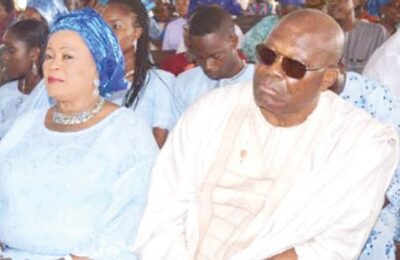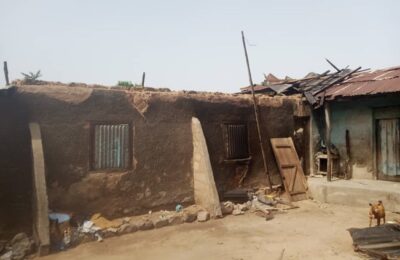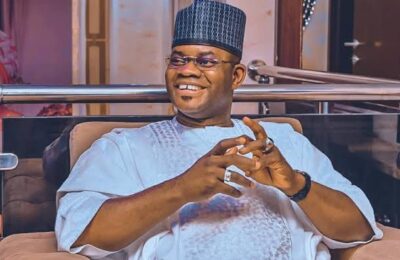There appears a crack within the ranks of the ruling Peoples Democratic Party (PDP) in Kogi State, as the relationship between Governor Idris Wada and his political godfather, Alhaji Ibrahim Idris, may have turned sour.
Idris, former governor of the state, sponsored Wada in the December 2011 governorship poll to the consternation of many party faithful who were taken aback by the last-minute decision to deny the initially favoured Alhaji Jibrin Isa Echocho the opportunity to vie for the seat on the platform of the PDP.
However, two years down the line, it seems the supporters of the past governor, whose influence in Kogi PDP cannot be underestimated, are biting their fingers for installing Wada as Kogi governor.
The son of the past governor and a member of the House of Representatives, Alhaji Mohammed Ibrahim, dropped the hint in an interview with newsmen in Abuja. He claimed that Governor Wada has failed to live up to the expectation of the people of Kogi State.
The lawmaker, who represents Ankpa/Omala/Olamaboro federal constituency, said Wada would face a herculean task to reclaim his mandate in the 2015 polls, even as he stressed that the changes in the polity would not affect the fortunes of the PDP at the elections.
Ibrahim spoke about his ambition and why he wants to explore it. “The government of Kogi State is not working in line with the aspirations of our people,” he said. “If you go home, poverty is too high in my place. I am telling you the gospel truth and we say we have a government.
“Although the governor comes from my party, but we would sort that one out later. Time would tell what would happen.
“All the same, we are remaining in the PDP. Kogi would remain a PDP state. The APC cannot constitute a threat to the PDP but there would be change within the government structure, by the grace of God. You cannot say my dad (Idris) made a mistake (in installing Wada as governor).”
On what would be the fate of a troubled PDP ahead of the 2015 polls, Ibrahim said: “PDP would come out of its present crises stronger. I am sure all the governors that defected to the APC would come back even before the 2015 polls. Things would take shape.
“Whatever that is happening now is very normal but I am assuring you that the PDP is a family and we would remain one in spite the fight in the family currently.
“We disagree to agree. That is why I told you that my state would remain a PDP state even as we would do our changes internally. All those going to the APC would come back.”
The lawmaker, who is a member of the House Committees on Environment, Privatisation, and Commerce and HIV/Aids, said he is taking advantage of constituency projects he has attracted to the state, to impact positively on the lives of his constituents.
Justifying the need for constituency projects, he said: “It is very necessary because without it, what do we tell our people? What can I offer my people most of whom do not have the means to come to Abuja? How would the people feel the impact of the government?
“For instance, I have dug several boreholes in the nooks and crannies of my constituency comprising Anpka, Omala and Olamaboro councils of Kogi State.
“As we speak, I have been able to ensure that several schools are made functional. Right there in Ankpa local government secretariat, the building of an ICT centre has been completed. All we are waiting for is to ensure the computerisation of the place, which they say they would do before the end of this fiscal year.
“The one for Olamaboro, as I speak, has been commissioned and is at the service of the people. We have faced disappointments with the contractor on the one meant for Omala. Without constituency projects, how would my people benefit from these projects?
“We have made improvements in the provision of potable water; we have provided solar energy-powered street lightening; we have built and furnished primary schools in my constituency. I also provide drugs to the people of Obagana that were affected by flood.
“Take note that we don’t execute these projects directly. We only make recommendations on what suits our people to the executive and it is their duty to go ahead to do them.
“Right now, I want to build additional standard markets for my constituents in the three local councils, as my own personal contribution. Already, I have secured the lands in central parts of my constituency to achieve the goal even before we get to the 2015 polls.
“I will be giving scholarships to 150 tertiary institution students from my constituency shared 50 apiece for the three local governments in my constituency. When we go home for the Christmas break, we would do all that, by the grace of God.”
On the implementation of the 2013 budget, Ibrahim said: “In the area of road construction, I will say, yes, they (Federal Government) have tried. If you ask me to score them, I will give them a pass mark.
“When I say a pass mark, that does not mean it is excellent. We will still need to ensure that we follow our duty by going to exercise our oversight functions from time to time. I think in the area of road construction, this government has tried considerably compared to what was obtainable before. Our democracy, as a nation, is still in the making.
“When you talk of budget implementation in its entirety, that is another entity that carries its own assessment. I will say no! It is appalling.
“The major factor is the finance ministry and we are made to understand that it is being handled by the Finance Minister, Dr. (Mrs.) Okonjo-Iweala. She dictates everything and Mr. President confirms it. Mr. President relies on her to give him all the necessary advice.
“But what they should realise is that what is on ground is different from bookwork. Okonjo-Iweala is doing her best but she has to be diplomatic in the whole thing.
“It is unacceptable to say that the reason for the poor implementation of the budget is due to non-availability of the budget because the money was appropriated for and it was given to them.”
On why the lack of faith on the part of the executive arm over budget implementation, Reps Ibrahim said: “This is a very big question. I will not be in a position to answer it. Oga at the top should be able to answer that question.
“We have always exercised our oversight functions. The leadership of the House gave us three weeks to go on oversight. All committees of the House had to suspend sittings to achieve the goal.
“If they say we just come to the House, sit and do nothing, I beg to disagree with you. Ours is to advise the executive arm on what is best for Nigerians, and we expect them to implement.
“I disagree with those who think that there are political undertones in our disagreement with the executive arm. As legislators, we don’t compromise our duties to achieve political gains whether you are a member of the PDP or APC.
“Legislators from across all political parties go on these oversight functions and whenever we turn in our reports, they are a reflection of what we see on ground. You will agree with me that this government has so many lapses and we all know that disagreements occur whenever we strive to correct them.
On the power sector reform, Ibrahim applauded the initiative, saying it would be of immense benefit to Nigerians.
He noted: “As I speak to you, we are supposed to go on oversight functions on all the power sector to be advertised. It was scheduled for the 8th of December. When we come back, we will be able to submit our reports on the floor of the House regarding the takeover of the power sector.
“The power sector reform will be most beneficial to Nigerians because now it has gone to the private hands that would ensure that things are done correctly. The issue of ‘I don’t care’, the issue that it is government property would not be there.
“The only problem is that fellow Nigerians would have to pay higher for electricity tariffs. But we are ready to pay a little bit higher as long as we have uninterrupted electricity supply.
“Whatever tariff charged is not comparable to the cost of diesel, fuel and operating our generating sets. I think this is a better deal if done to the letter. The power sector reform is what we require to jumpstart the economy.
“Under the current dispensation, there is nothing like government property in the power sector. Those who invested heavily in it would not sit down and allow it to be mismanaged. I think for it to work, consumers should be ready to pay a little bit higher than what they are paying now.
“Naturally, they (operators) have to offer the service before they increase the tariff. Certainly, if they make up their minds to increase tariff at take-off point, there would be crises. They should rather prove to consumers, prove to the generality of Nigerians that the increment would be worth it.
“If we see steady power and they ask us to pay N50, N100 additional to what we were paying before, there won’t be complaints. This is part of the basis of our oversight. We at the committee on privatisation and commercialisation want to go and see, assess things for ourselves and present our reports on the floor of the House.”
On the proposed national dialogue, Ibrahim expressed reservation over the initiative, noting that Nigerians could misunderstand it by imputing political undertones to it.
According to him: “When you say you want to organise a national dialogue, what is going to be my take here at the National Assembly because this is supposed to be our work in the real sense of it because our constituents elected us to the parliament to deliberate on their behalf.
“But for me, the timing is not correct because 2015 is around the corner. It could be misunderstood because we are approaching the electioneering period. The intention might be genuine but the timing is wrong.
“As things stand, we just have to forge ahead with it and make sure it is done properly so that the objective can be achieved. As I stated, why now since it is an affair that you cannot remove politics from it?
“There are questions as to whether it makes sense to make ethnicity the basis of representation to the confab. I think the idea would cause confusion.
“For me, the timing of the confab is wrong. Not when the election is by the corner. However, good thing about it is that it (outcome of the conference) would still be brought to the floor of the House.”




